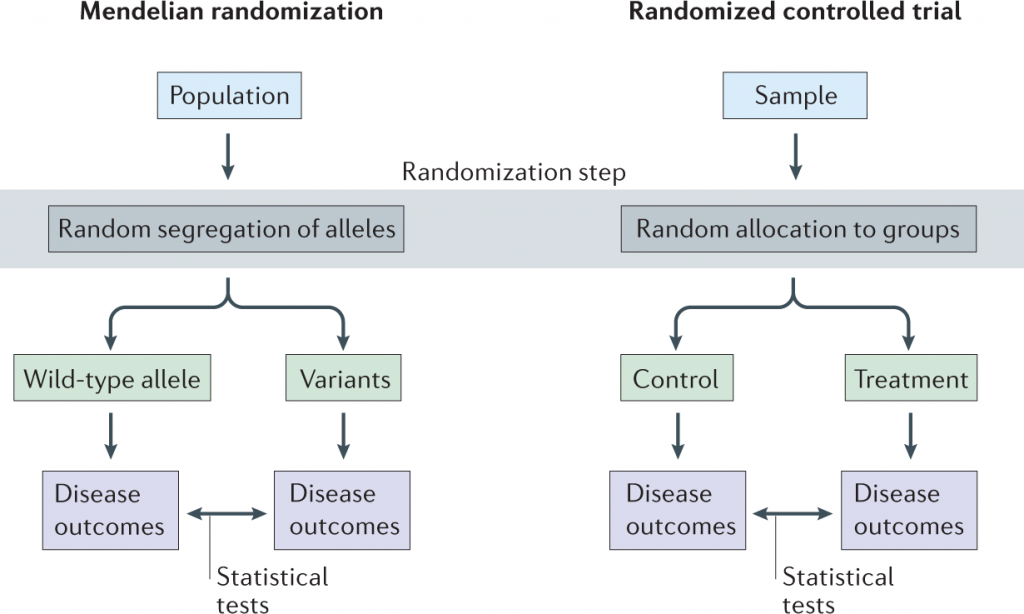
Depression is one of the most common psychiatric illnesses (Smith K, 2014) and the World Health Organisation estimates that by 2030 depression will become the leading cause of disability worldwide (WHO, 2011). While the causes of depression are complex and involve many factors, recent research suggests that there may be a link between metabolites (substances that are produced when the body breaks down food like amino acids) and depression (Holthoff VA, 2004; Davyson E et al., 2023).
For example, Omega-3 (a fatty acid commonly found in oily fish, flax seeds, and walnuts) has often been discussed with regard to its potential role in depression and anxiety (Burscheidt L, 2016; Negrone A, 2021). However, early evidence was inconsistent and no definitive conclusions on the relationship between such metabolites and depression could be drawn. This may have been particularly because of small sample sizes of these early research studies.
More recently, a large study of over 15,000 individuals found evidence that a distinct metabolomic profile was associated with depression (Bot M et al., 2020). However, studies like these are often affected by confounding, meaning that the results may be influenced by other factors that have not been measured in the study which could potentially distort the true relationship. Therefore, conclusions about causality (i.e., whether metabolites cause depression) could not yet be drawn.
Davyson et al. (2023) recently addressed the limitations of these earlier studies by examining the association between metabolites and depression and assessing their causality using two main techniques, Mendelian Randomization (MR) and colocalization.
MR takes advantage of the fact that genes are randomly assigned to individuals at birth (Lawlor DA, 2008; Davey Smith G, 2014). It is a technique believed to mirror randomised controlled trials (RCTs). Using MR, one can explore whether metabolite levels cause depression, possibly allowing for new treatment targets to be identified and applied to future depression interventions.
Another method that can help study causal effects is colocalization analysis. This technique helps to identify potentially causal gene targets by testing whether the genetic signals for depression and the genetic signals for the metabolites suggest that there is a shared cause between the two.

Mendelian Randomization is an analysis technique that mirrors randomised controlled trials and can be used to explore whether a factor, like fatty acids, causes an outcome, like depression. [Figure, Sanderson et al (2022)]. View full-sized figure.
Methods
The authors used a large prospective study, the UK Biobank (UKB), which is comprised of 502,492 individuals between the ages of 40 and 69. Data were available for 249 metabolites (e.g., amino acids) and depression diagnosis was confirmed using the Thoughts and Feelings Questionnaire. A total of 29,757 participants were included in this study – 8,840 with a depression diagnosis and 20,917 healthy controls.
A regression analysis was used to test the relationship between each metabolite and depression. Several relevant confounders were also included, like age, sex, and body mass index (BMI).
Genome-wide association studies (GWAS) were performed to identify single nucleotide polymorphisms (SNPs; a common type of genetic variation among individuals) that were strongly associated with each individual metabolite. This was conducted using data from 88,329 unrelated individuals of European ancestry.
Bi-directional MR was used to investigate whether metabolites could be said to cause depression. This was done using data from a GWAS of depression conducted by other researchers (Howard DM, 2019).
Colocalization was performed to investigate whether there was any overlap in genes present in depression and genes in the previously identified genetic signals. A final MR analysis was then used to assess the causal relationship between these specific genes identified and depression.
Results
129 metabolites were found to be associated with an individual being diagnosed with depression diagnosis in their lifetime.
144 metabolites were genetically correlated with depression (meaning the two traits share genetic causes) and of these, approximately 83% were found to be associated with the typical behavioural characteristics of depression. This means that both the genes predisposing a person to depression and the observable traits of depression were associated with higher levels of certain metabolites.
Using MR, a negative causal relationship was found between four metabolites and depression. This means that these four metabolites have a protective effect against one’s lifetime risk of depression. Specifically, these included increased Omega-3, Omega-3:Total Fatty Acids ratio, docosahexaenoic acid (DHA; an omega-3 fatty acid), and the degree of unsaturation (number of carbon-carbon double bounds). In contrast, the Omega-6:Omega-3 ratio had a positive causal effect on depression and so increases one’s risk of developing depression in their lifetime.
There was no evidence that depression had a causal effect on any metabolite levels. This means that while there is evidence suggesting that metabolites may cause depression, there is no evidence of the opposite effect (i.e., depression does not appear to cause a change to an individual’s metabolite concentration).
When investigating colocalization, only one omega-3 fatty acid showed evidence of colocalization with depression – a single SNP in a gene was found to play a role in this fatty acid’s breakdown. When running the colocalization analysis for this specific gene region, the authors found little evidence of a shared cause for this gene and depression.

Fatty acids may play a role in causing depression but the reverse does not seem to be true (i.e., depression does not cause a change in fatty acid concentrations in the blood).
Conclusions
The authors concluded that an omega-3 fatty acid, DHA, may protect individuals against depression. Further, the authors also suggest that a high omega-6:omega-3 fatty acid ratio may play a role in causing depression.
The authors argue that the relationship between the omega-6:omega-3 ratio and depression may be driven by increases in inflammation and this is supported by previous studies which have found that a higher omega-6:omega-3 ratio is associated with levels of inflammation (Wei Y, 2021). The authors conducted additional MR analyses and found that certain genes involved in inflammation are also associated with depression. However, the colocalization results suggest that certain biases may have affected the results, and this means conclusions about causality cannot be definitively drawn.

Fatty acids, like omega-3 (commonly found in fish oil), may have a protective effect against lifetime depression risk.
Strengths and limitations
This study used a hypothesis-free technique to investigate the association and causal relationship between 249 metabolites and depression. By using this method, the possibility of confirmation bias, which is the tendency to use new evidence to support existing beliefs, is reduced. Further, the authors used a large number of people in their study and measured metabolites in a standardised, well-documented way. They also used several different approaches to investigate the same research question, which enables what is referred to as triangulation of results and thus strengthened the conclusions that could be drawn about causality.
However, depression is primarily a brain-based disorder and the authors used blood plasma metabolite levels in their investigation. Blood samples are minimally invasive which is important for large-scale studies, and this is likely the reason the authors opted for this approach. However, it could mean that the authors were not investigating the exact relationship of interest. The results from this study are also not generalisable to the whole population because the genetic data used were only from individuals with European ancestry. The lack of representation of individuals without European ancestry is a systemic issue throughout epidemiological research.

This study had a large sample size and used several different approaches to investigate the same research question, allowing for stronger conclusions to be drawn.
Implications for practice
The findings from this paper have important implications for the development of new treatments for depression.
It is encouraging that this paper was able to identify a potential new target for treating depression, especially given the low success rates of currently available treatments. For example, the findings suggest that a dietary intervention that lowers certain fatty acids could be a promising approach for treating depression. However, further research is needed to confirm the findings of this study and to examine the potential benefits of such a treatment. For example, RCTs could be used to investigate whether changes in diet, specifically the consumption of polyunsaturated fatty acids like omega-3 and omega-6, affect the severity of an individual’s symptoms of depression. If the findings are consistent with this paper, the overall impact could be huge, but much more evidence is required before such a treatment can be implemented into general practice.
In the UK and many other countries worldwide, mental health services are massively underfunded and this impacts the care individuals can receive. Similar to exercise, which has also been shown to influence symptoms of depression (Bentivegna F, 2022; Nedoma R, 2021), dietary changes can be implemented at an individual level without much input from external sources. Further, individuals may feel like they have greater agency over their own treatment and are able to take some action while waiting to see a mental health practitioner.
This paper used modern research techniques focused on genetics which can offer insight into the casual relationship between two factors, in this case metabolites and depression. However, sometimes genes are related to multiple factors. This means a form of bias appears. Next, the relationship between polyunsaturated fatty acids and depression needs to be examined using techniques (like multivariable MR; Sanderson E, 2019) that can include other relevant factors, like BMI. Only then can we really begin to disentangle the complex relationship between diet and psychiatric disorders like depression.

Like exercise, which has also been linked to depression, dietary changes can be implemented by individuals without much input from external sources. However, more research is needed before these techniques can be implemented as possible treatments for psychiatric illnesses like depression.
Statement of interests
Daisy Crick is a PhD student at the Medical Research Council Integrative Epidemiology Unit at the University of Bristol. Her research is predominantly focused on investigating the causes and consequences of inflammation with a specific interest on the novel biomarker, Glycoprotein Acetyl.
Links
Primary paper
Davyson E, Shen X, Gadd DA, Bernabeu E, Hillary RF, McCartney DL, Adams M, Marioni R, McIntosh AM. (2023) Metabolomic investigation of major depressive disorder identifies a potentially causal association with polyunsaturated fatty acids. Biol Psychiatry. 2023 Feb 8:S0006-3223(23)00055-0 https://doi.org/10.1016/j.biopsych.2023.01.027
Other references
Bentivegna, F. Aerobic exercise for major depression: the role of reward processing and cognitive control. The Mental Elf, 28 Sep 2022.
Bot, M., et al., Metabolomics profile in depression: a pooled analysis of 230 metabolic markers in 5283 cases with depression and 10,145 controls. Biological psychiatry, 2020. 87(5): p. 409-418.
Burscheidt L. Omega-3 fatty acids for depression: Cochrane find insufficient evidence to support use. The Mental Elf, 26 Jan 2016.
Davey Smith, G. and G. Hemani, Mendelian randomization: genetic anchors for causal inference in epidemiological studies. Human Molecular Genetics, 2014. 23(R1): p. R89-R98.
Grosso, G., et al., Role of omega-3 fatty acids in the treatment of depressive disorders: a comprehensive meta-analysis of randomized clinical trials. PloS one, 2014. 9(5): p. e96905.
Holthoff, V.A., et al., Changes in brain metabolism associated with remission in unipolar major depression. Acta Psychiatrica Scandinavica, 2004. 110(3): p. 184-194.
Lawlor, D.A., et al., Mendelian randomization: using genes as instruments for making causal inferences in epidemiology. Stat Med, 2008. 27(8): p. 1133-63.
Nedoma, R. Exercise can help reduce depressive symptoms in people who are not clinically depressed. The Mental Elf, 16 Jul 2021.
Negrone A. Omega-3 supplements for depression and anxiety #ActiveIngredientsMH. The Mental Elf, 9 Dec 2021.
Sanderson, E., et al., (2019) An examination of multivariable Mendelian randomization in the single-sample and two-sample summary data settings. International Journal of Epidemiology, 2019. 48(3): p. 713-727.
Sanderson, E., Glymour, M.M., Holmes, M.V. et al. (2022) Mendelian randomization. Nat Rev Methods Primers 2, 6 (2022). https://doi.org/10.1038/s43586-021-00092-5
Smith, K., Mental health: a world of depression. Nature, 2014. 515(7526): p. 181.
Wei, Y., et al., The effects of low-ratio n-6/n-3 PUFA on biomarkers of inflammation: a systematic review and meta-analysis. Food Funct, 2021. 12(1): p. 30-40.
WHO, Global burden of mental disorders and the need for a comprehensive, coordinated response from health and social sectors at the country level. Executive board paper, agenda item 6.2. 2011. pdf
Photo credits
- Photo by CA Creative on Unsplash
- Photo by Tamas Pap on Unsplash
- Photo by Towfiqu barbhuiya on Unsplash
- Photo by Alina Grubnyak on Unsplash
- Photo by Farhad Ibrahimzade on Unsplash
